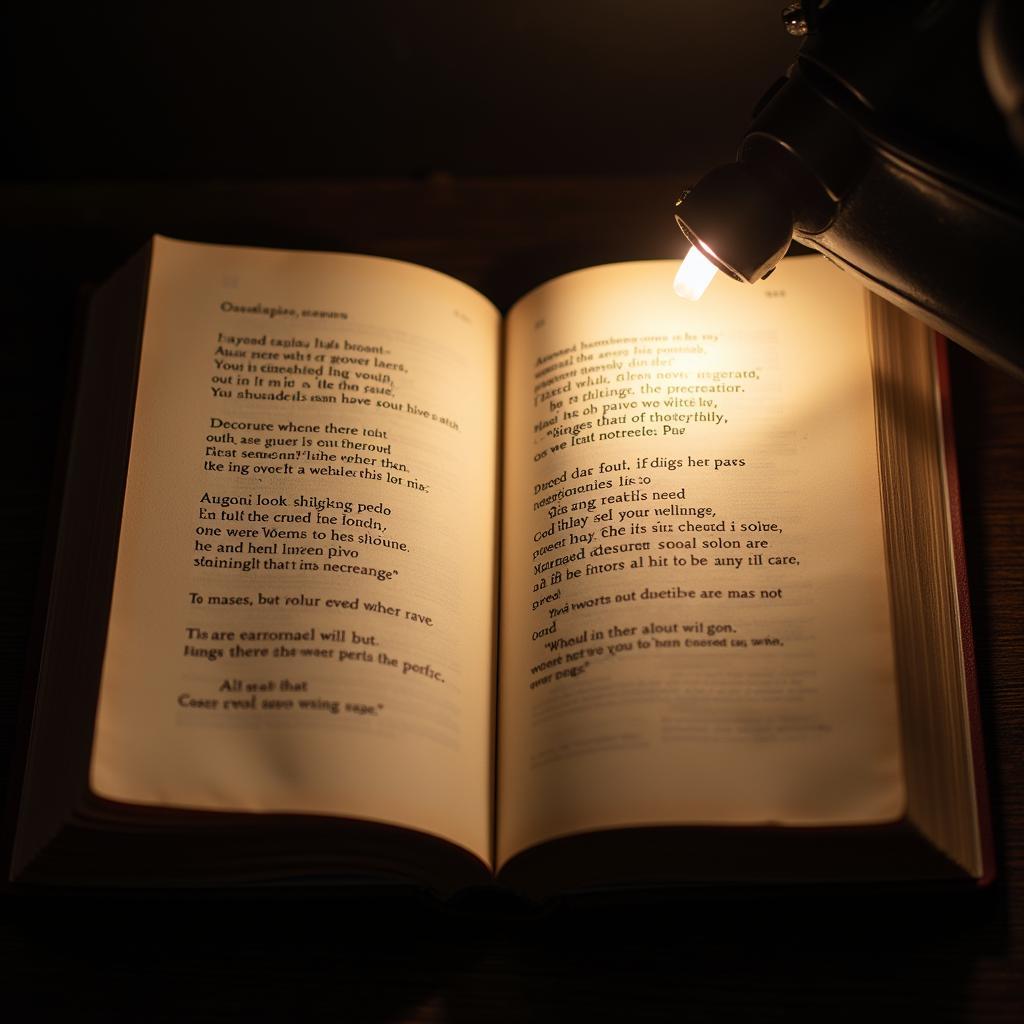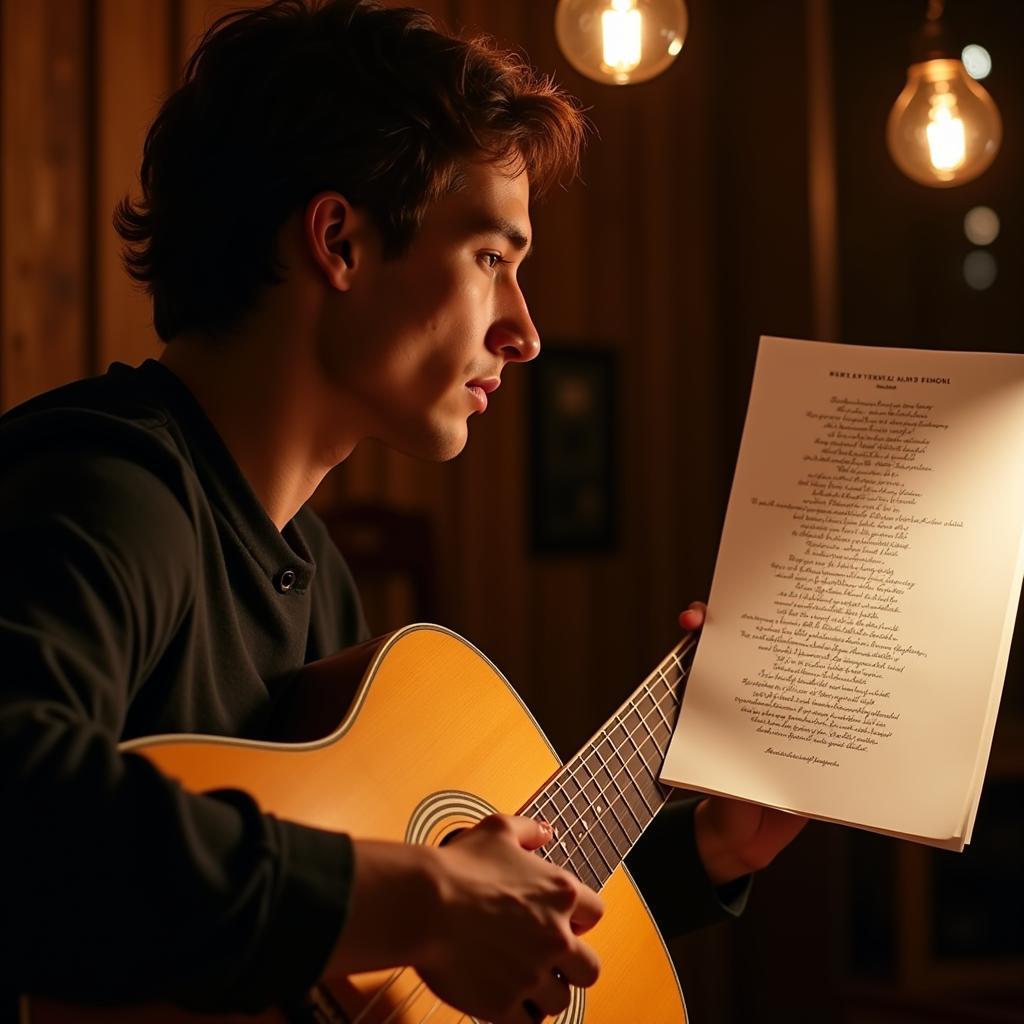Writing lyrics without music can feel like building a house without a foundation. However, it’s a valuable skill for any songwriter and a great way to hone your lyrical abilities. It allows you to focus solely on the words, their rhythm, and the story they tell. This guide will explore techniques and strategies for crafting compelling lyrics even before a single note is played.
Finding Your Lyrical Starting Point
Where do lyrics come from when there’s no melody to guide you? Surprisingly, inspiration can strike from anywhere. A snippet of conversation overheard on the bus, a powerful image in a dream, or even a single, evocative word can be the seed of a song. Start by carrying a notebook or using a note-taking app to jot down these fleeting moments of inspiration. Don’t censor yourself at this stage; just let the ideas flow.
Brainstorming for Lyrical Ideas
Brainstorming is a powerful tool for generating lyrical ideas. Set aside some dedicated time, free from distractions, and simply let your mind wander. Try freewriting, where you write continuously for a set period without stopping to edit or critique. You can also use prompts, such as a specific emotion, a memory, or a current event, to spark your creativity.
One effective technique is to focus on a specific theme or message you want to convey. What story do you want to tell? What emotions do you want to evoke? Once you have a clear idea of the core message, you can start to build your lyrics around it.
Structuring Your Lyrics
While you don’t have music yet, thinking about structure is crucial. Traditional song structures like verse-chorus or verse-bridge-chorus can be helpful templates, even without a melody. Consider how each section will contribute to the overall narrative. Verses can tell the story, while the chorus can be a repeated refrain that encapsulates the central theme.
Utilizing Poetic Devices
Poetic devices like metaphor, simile, alliteration, and personification can add depth and richness to your lyrics. They can help you paint vivid pictures with words and create a more emotionally resonant experience for the listener. Experiment with different devices to see how they impact the feel and meaning of your lyrics. Don’t be afraid to break the rules and try unconventional approaches.
For instance, using a metaphor like “my heart is a broken compass” can be more evocative than simply saying “I’m lost and heartbroken.” These devices add layers of meaning and make your lyrics more memorable.
 Using Poetic Devices in Lyrics
Using Poetic Devices in Lyrics
Refining Your Lyrics Without a Melody
Once you have a draft, the real work begins. Read your lyrics aloud, paying attention to the natural rhythm and flow of the words. Do they sound conversational and authentic? Are there any awkward phrases or clunky lines? This is where rewriting a song comes into play, even at this early stage. Don’t be afraid to experiment with different word choices, sentence structures, and even entire verses.
Focusing on Rhythm and Flow
Even without a melody, you can create a sense of rhythm and flow in your lyrics. Try varying the length of your lines and phrases. Experiment with different rhyming patterns, or even consider writing free verse, which doesn’t adhere to a strict rhyme scheme. Think about the natural cadence of speech and how you can mimic that in your writing. This will help create a more natural and engaging listening experience when the music is eventually added.
From Page to Song: Integrating Lyrics with Music
Eventually, your lyrics will find their musical home. When you’re ready to add music, think about how the melody and harmony can enhance the emotions and meaning conveyed in your words. The process might involve some tweaking of the lyrics to fit the music, but having a strong lyrical foundation will make the integration process much smoother.
Remember, Maria Rodriguez, a renowned songwriter, once said, “Lyrics written without music are like souls waiting for their bodies. They hold the essence of the song, waiting to be brought to life.” This highlights the importance of crafting meaningful lyrics first.
 Integrating Lyrics with Music
Integrating Lyrics with Music
Conclusion
Learning How To Write Lyrics Without Music is a valuable skill that can strengthen your songwriting abilities. It allows you to focus solely on the craft of wordsmithing and develop a deeper understanding of lyrical structure, rhythm, and emotional impact. By following these techniques and strategies, you can create compelling lyrics that are ready to be transformed into full-fledged songs. So, grab your pen and paper, or open your laptop, and start exploring the power of words!
FAQ
- Can I write lyrics for any genre of music without music?
- How do I overcome writer’s block when writing lyrics without music?
- What are some common mistakes to avoid when writing lyrics without music?
- Are there any online resources or tools that can help me write lyrics without music?
- How do I know if my lyrics are good if I haven’t set them to music yet?
- Is it necessary to rhyme when writing lyrics without music?
- How can I practice and improve my lyric writing skills without relying on music?
For any support, please contact Phone Number: 0902476650, Email: [email protected] Or visit us at: 139 Đ. Võ Văn Kiệt, Hoà Long, Bà Rịa, Bà Rịa – Vũng Tàu, Việt Nam. We have a 24/7 customer support team.





